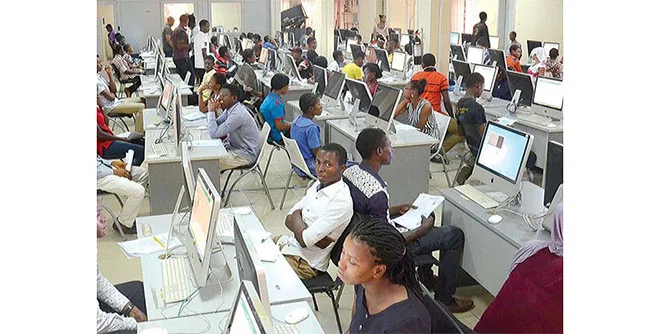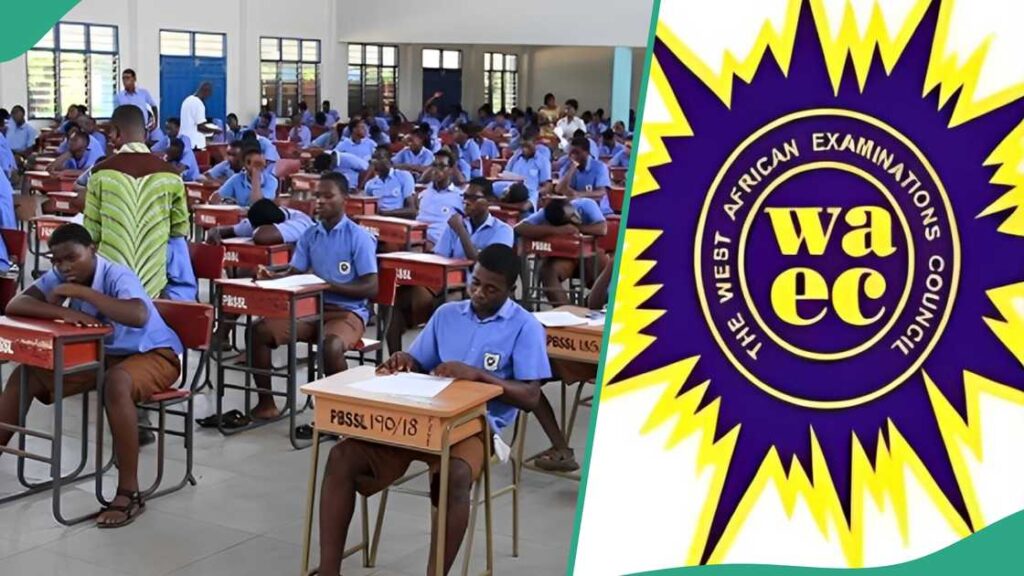The Federal Government has drawn a clear line in the sand: by 2026, every component of the WAEC and NECO Senior School Certificate Examinations (SSCE) will be written fully on Computer‑Based Testing (CBT) platforms. The transition will begin this November 2025 with all objective papers, before the essay (theory and practical) components migrate in May/June 2026. Officials insist there is no going back—the move is designed to restore integrity to the examination system, end organised malpractice, and accelerate the digital transformation of Nigeria’s assessment architecture.
Speaking after monitoring pilot CBT runs and recent examinations, Minister of Education, Dr. Tunji Alausa, praised NECO’s trial SSCE CBT and confirmed that both private and public accredited CBT centres—similar to what the Joint Admissions and Matriculation Board (JAMB) already uses—will host these school-based exams from 2026. The government has also set November 2025 for all objective papers to go CBT, locking in the first phase of the transition ahead of full migration the following year.
Table of Contents

What exactly is changing—and when?
The timeline at a glance
- November 2025: WAEC and NECO begin administering all objective papers via CBT.
- May/June 2026: Full migration—including essay/theory and practical components—to CBT.
- From 2026 onward: Exams leave school premises and will be conducted exclusively at accredited CBT centres nationwide.
This marks a fundamental shift from the traditional school-based, paper-and-pencil model to the JAMB-style hub-and-spoke CBT centre network, with the Government emphasising that CBT centres—many owned by Nigerian private entrepreneurs—will anchor a new value chain in the education and ICT sectors.
Why the Federal Government says there’s “no going back”
Dr. Alausa has repeatedly framed the reform as a fight for credibility. JAMB’s experience—where CBT significantly reduced large-scale cheating and paper leakages—is the government’s proof of concept. WAEC and NECO’s vulnerability to leaks, impersonation and large-scale malpractice, he argues, cannot be solved without digitising the entire chain, from question delivery to candidate authentication and automated marking (where appropriate).
Officials also say the transition will:
- Curb malpractice at scale through encrypted question delivery, biometric verification, CCTV surveillance and tighter centre-level controls.
- Speed up results processing using auto-marking for objective components and structured digital marking workflows for essay scripts.
- Create jobs and spur investment in CBT infrastructure, power back-up, connectivity and proctoring technologies, especially as the government invites private CBT operators to participate.
In addition, the Federal Ministry of Education recently had to debunk fake reports suggesting cancellations of WAEC/NECO 2025 exams, underscoring how misinformation can erode public trust and why reforms must be clearly communicated.
The scale of the task: Millions of candidates, thousands of centres
To appreciate the logistical heft, consider this: over 1.36 million candidates registered for SSCE this year, according to the government, numbers that highlight why scaling CBT must be meticulously planned. The House Committee on Basic Education has already pledged to collaborate with the exam bodies to raise standards and smooth implementation.
The FMINO (Federal Ministry of Education) statement adds that all examinations will be held at accredited centres outside schools, a move intended to standardise facilities, reinforce security, and reduce the chaos often associated with school-based settings.
The friction points: Stakeholders push back
Not everyone is convinced that 2026 is realistic. A cross-section of parents, teachers and policy analysts warn that:
- Digital readiness is uneven—many students, especially in rural and underserved areas, have limited hands-on computer experience.
- Power and connectivity gaps could disrupt exams, particularly in states with fragile infrastructure.
- CBT is not naturally suited to all question types, especially complex essays, diagrams, and practicals—without strong proctoring and robust platforms, CBT may introduce new vulnerabilities.
- Psychological readiness is lacking for many teenagers suddenly asked to switch to timed high-stakes tests in unfamiliar digital environments.
Parents-Teachers Association leaders have even called the 2026 deadline “unrealistic”, urging a phased roll-out with heavy investments in teacher training, student digital literacy, and test platform resilience, rather than a single hard deadline.

How WAEC & NECO can make CBT work (and win trust)
1) Phase it intelligently (which the FG has now committed to):
Starting with objective papers in November 2025 gives the bodies a live, lower-risk stress test of their infrastructure, allowing them to collect operational data and fix weak points before the essay migration in 2026.
2) Build a national CBT centre map and capacity plan:
A transparent, public CBT centre registry—with each centre’s seat capacity, power redundancy, connectivity uptime, CCTV coverage and proctor-student ratio—will increase trust and allow schools to plan early. ThisDay already reports that private and public centres will be pooled for SSCE from 2026; the devil will be in the accreditation detail.
3) Invest in offline-first, auto-syncing exam platforms:
With Nigeria’s patchy internet, exam software must work securely offline and sync encrypted responses when connectivity is restored. That way, outages don’t invalidate entire sessions.
4) Ramp up candidate digital literacy early (SS1–SS3):
Schools should embed basic CBT practice in continuous assessment to reduce anxiety and ensure students see CBT as normal, not novel.
5) Upgrade proctoring & identity verification:
Beyond biometrics, exam bodies should consider AI-assisted proctoring, keystroke biometrics, and device lockdown protocols for integrity, especially once essays go digital.
6) Provide a robust appeals & redress mechanism:
When technology fails, students must have clear, fast remediation pathways—from instant re-sits to transparent audit trails—so trust isn’t lost to tech glitches.
Lessons from JAMB’s CBT journey
JAMB’s decade-long pivot holds critical lessons: proactive centre accreditation, ruthless de-accreditation of erring centres, biometric capture, CCTV audits, and heavy sanctions for attempted fraud are non-negotiable. But JAMB’s experience also warns of early pain points: power failures, system lag, server overloads, and network congestion must be anticipated and solved before WAEC/NECO scale.
Policy guardrails the FG should publish—fast
To convert this ambitious policy into a smooth reality, the Federal Government should urgently publish:
- A National SSCE CBT Readiness Framework with minimum technical and security standards for centres.
- A financing & incentive model for public schools that will now need to relocate their candidates to external CBT centres, including transportation logistics and cost-sharing formulas.
- A national training plan for teachers, centre staff, and candidates, including mock CBT exams funded or subsidised by the Government.
- A disaster recovery and continuity plan for outages, natural disasters, or cyberattacks, especially for essay components in 2026.
- A clear communication protocol to counter misinformation and provide authoritative, real-time updates to students, parents, and schools.
What students, parents, and schools should do now
Students:
- Start practising on CBT mock platforms for both objective and essay questions.
- Learn time management on screens, especially for long essays.
- Get comfortable with typing speed, on-screen reading, and digital navigation.
Parents:
- Encourage regular computer exposure at home or community hubs.
- Demand that schools run internal CBT mock tests and share readiness plans.
- Budget for potential logistics costs (e.g., travel to external CBT centres) in 2026.
Schools:
- Audit your students’ digital readiness now; close the gaps with structured training.
- Partner early with nearby accredited CBT centres to understand capacity and logistics.
- Run full-dress rehearsals—power, backups, timing, invigilation, candidate flow—to identify weaknesses well ahead of 2026.

Conclusion
On July 25, 2025, the message from Abuja is unambiguous: WAEC and NECO will be fully CBT by 2026—and the countdown has already started. The November 2025 switch for objective papers is the first hard deadline. The Government believes this is how to restore integrity, curb malpractice, and modernise assessment. But to make it work at the scale of over a million SSCE candidates, Nigeria must confront infrastructure gaps, digital literacy disparities, and the challenge of adapting essays and practicals to robust, secure CBT platforms.
If the Government, exam bodies, states, private CBT operators, schools, and parents align and move quickly, 2026 can be the year Nigeria finally drags its high-stakes secondary school exams into the digital age—without leaving its most vulnerable students behind. If not, the reforms risk entrenching a new kind of inequity: digital advantage as destiny. The next 12 months will tell which path we choose.
Quick FAQ
Will essays really be CBT too?
Yes. Objectives go CBT from November 2025; essays/theory and practicals follow in May/June 2026.
Will exams still hold inside schools?
No. They’ll move to accredited CBT centres—public and private—nationwide.
Is the 2026 target final?
The Government says there’s “no going back.” But meeting that date will depend on centre capacity, power, connectivity, teacher training, and student digital readiness—areas stakeholders warn must be urgently addressed.
How many candidates are affected?
Over 1.36 million candidates registered for SSCE this year alone—illustrating the scale of what lies ahead.
Join Our Social Media Channels:
WhatsApp: NaijaEyes
Facebook: NaijaEyes
Twitter: NaijaEyes
Instagram: NaijaEyes
TikTok: NaijaEyes
READ THE LATEST EDUCATION NEWS








































